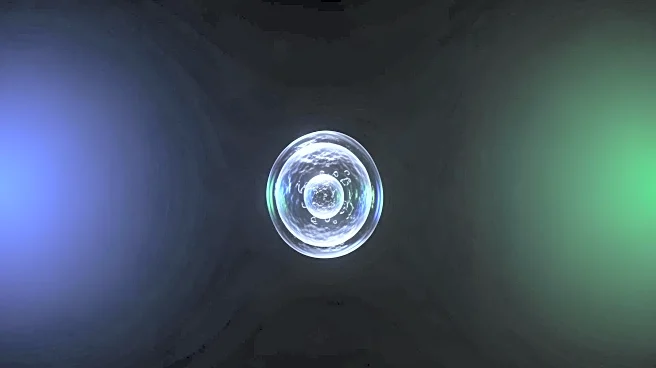What's Happening?
Scientists have discovered a cell with a highly reduced genome that challenges traditional definitions of life. The cell, named Candidatus Sukunaarchaeum mirabile, has a genome consisting of only 238,000 base pairs, significantly smaller than previously
known genomes. This discovery was made by Takuro Nakayama and his team at the University of Tsukuba, who isolated the cell from seawater samples. The cell appears to be a parasite, entirely dependent on a host for its nutritional needs, lacking the genetic pathways typically considered essential for survival. This finding pushes the boundaries of understanding cellular life, revealing forms that are barely alive and highlighting the vast biodiversity in ocean environments.
Why It's Important?
The discovery of Candidatus Sukunaarchaeum mirabile is significant as it expands the understanding of cellular life and its evolutionary possibilities. It challenges the notion of what constitutes a living organism, showing that life can exist in extremely minimal forms. This has implications for the study of evolution and biodiversity, particularly in nutrient-poor environments like the ocean. The research could lead to new insights into symbiotic relationships and the evolutionary processes that lead to such minimalistic life forms. It also raises questions about the potential for undiscovered life forms in other extreme environments, possibly even beyond Earth.
What's Next?
Further research is likely to focus on understanding the ecological role and evolutionary history of Candidatus Sukunaarchaeum mirabile. Scientists may explore its interactions with host organisms and the benefits it might provide, despite its parasitic nature. There is potential for discovering more organisms with similarly reduced genomes, which could redefine biological classifications and evolutionary theories. Additionally, this research may inspire studies into the applications of minimal cells in biotechnology and synthetic biology, exploring how such organisms can be harnessed for human benefit.
Beyond the Headlines
The discovery of such a minimal cell raises ethical and philosophical questions about the definition of life. It challenges the criteria used to classify living organisms and may influence future scientific and philosophical debates. The implications for astrobiology are profound, as it suggests that life could exist in forms previously thought impossible, potentially broadening the search for extraterrestrial life. This discovery also highlights the importance of preserving ocean environments, which may harbor undiscovered biodiversity crucial for understanding life on Earth.
















